by Doreen Abi Raad

BEIRUT (CNS) – Lebanon’s younger generation of Catholics sees Pope Benedict XVI’s Sept. 14-16 visit to their country as a sign of hope in a region embroiled with violence.
Marielle Boutros, a 25-year-old Maronite Catholic from Jbeil who teaches science at a Catholic school, said the pope’s visit “means that even though we are suffering and don’t have stability, there is someone in this world who cares for us and wants us to stay here.”
“That’s why he’s coming here, to tell us to stay here and not to quit our cause,” she said.
Firas Wehbe, a 34-year-old Maronite Catholic who heads up the sales unit of a bank, said the pope’s visit “is a sign of hope for the youth, a support for them to stay in their country and the Middle East, especially with the turbulent situation around us.”
Wehbe said that when Pope John Paul visited Lebanon in 1997 and the country was under Syrian occupation, it was “a bad situation.”
“But now, it’s all the region,” Wehbe said. “So I think that this visit is a sign from God, a message for us to resist in a Christian way, through our beliefs, to stay here in the holy lands and to live our lives according to the Bible. Otherwise, we can go everywhere in the world. But here, we have a message to live all together with other religions, especially Muslims.”
“I’m talking from personal experience, because I live in Tripoli, which is 90 percent Muslim,” Wehbe said. “In fact, we don’t have problems as Christians, but the city is experiencing political problems related to the situation in Syria. The conflict in Syria is affecting the city, but we hope it will end soon.”
Clashes between pro- and anti-Syrian groups in Tripoli in May and June killed up to 25 people.
The Vatican spokesman, Jesuit Father Federico Lombardi, said despite instability from Syria that has spilled across Lebanese borders, preparations for the trip “are proceeding without any uncertainties on the Vatican’s part.” In fact, he said, the popemobile has already been shipped to Lebanon.
During his visit, Pope Benedict will present a major document addressing concerns expressed at the 2010 Synod of Bishops on the Middle East, but on Sept. 15, he is expected to meet with about 30,000 young people at Bkerke, the patriarchal seat of the Maronite Catholic Church, north of Beirut.
Father Toufic Bou Hadir, president of the Maronite Patriarchate’s Youth Department, has been planning the visit with a team of youth representatives from Lebanon’s Catholic rites – Maronite, Syriac, Armenian, Chaldean, Melkite, Coptic and Latin – as well as representatives of scout associations, apostolic movements, students, nongovernment organizations, youths with special needs, religious and seminarians and representatives of other Mideast countries.
“The Middle Eastern countries are now living a so-called ‘spring.’ But a lot of places are seeing that spring turning into winter and fall because we see blood and terror around us,” said Father Bou Hadir, referring to the instability in the region.
“But we have faith that the real spring is our youth having real faith in God,” he added.
The priest said Pope Benedict’s visit would reinforce what Pope John Paul II said when he visited in 1997, “that Lebanon is more than a country, it’s a message of peace and coexistence between the East and the West.”
Of Lebanon’s population of nearly four million, approximately one-third is Christian. The country’s population belongs to 18 different religions, 12 of which are Christian.
Joe Zoulikian, a 33-year-old Armenian Catholic who works at the American University of Beirut, described Pope Benedict’s visit as “very emotional, because the head of Catholic Church is coming to Lebanon while the region is full of war and revolutions.”
“For us it’s a (sign of) hope to stay,” Zoulikian said.
Joseph Semaan, a 36-year-old Maronite from Beirut who works as a technology manager and represents the Scouts of Lebanon on the youth meeting planning committee, said the pope’s visit “will give us empowerment and hope.”
About 500 of Lebanon’s some 10,000 scouts will be assisting during the entire weekend of the pope’s visit to Lebanon, mostly serving as ushers.

One thought on “For Lebanese, Papal Visit Is Sign of Hope”
You must sign in to leave a comment.